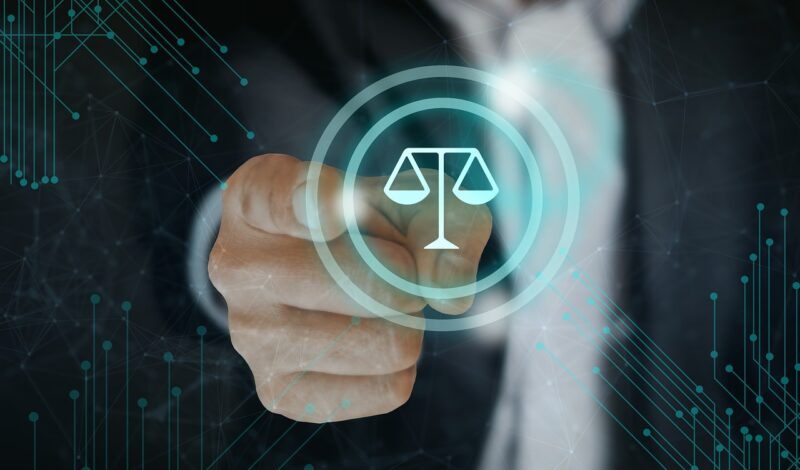Future-Ready Law: How AI Is Shaping and Facilitating Legal Work
✍🏼Faisal Alqasim
22/10/2024
The future of the legal profession is promising, yet it will undergo significant changes driven by technology and innovation. Just like other fields, law is not immune to the rapid advancements brought about by artificial intelligence (AI). This transformative force is reshaping how legal services are delivered and altering the fundamental aspects of the profession. While it’s not about whether these changes are positive or negative, it’s about how AI is making an unprecedented impact. The legal profession, historically rooted in human judgment, relies on understanding the complexities of cases, gathering relevant data, and working closely with clients to achieve favorable outcomes. AI is now poised to change many of these traditional practices.
In this article, we will explore the challenges facing the legal profession as it confronts the rise of AI and technological advancement. The introduction of AI into legal work has opened doors to major shifts, particularly in how efficiently legal tasks are performed. Here are some key ways in which AI is impacting the profession:
1.Increased Efficiency: AI assists lawyers with routine tasks such as legal research and document analysis, allowing them to focus on more strategic and complex work.
2.Error Reduction: AI systems are highly accurate, which reduces the human errors often seen in document preparation or analysis.
3.Faster Decision-Making: AI provides faster access to analyses and information, enabling lawyers to make quicker, more informed decisions.
4.Advanced Case Analysis: AI can offer predictive insights based on available data, helping lawyers foresee possible outcomes in legal trials.
A pressing question for many in the legal field is whether AI poses a real threat to the profession. The short answer is yes—it challenges certain traditional practices, particularly for those resistant to change. However, AI will not entirely replace lawyers. Here’s why:
•Ethical Decision-Making: AI lacks the ability to make ethical judgments. Lawyers are needed to provide legal and ethical guidance, which requires human wisdom and empathy.
•Client Relationships: Building strong relationships with clients is a critical part of legal practice, something AI cannot replicate to the same degree as human lawyers.
However, AI may pressure those who rely heavily on routine tasks, like drafting contracts or gathering information, to adapt. These lawyers will need to shift their focus to more strategic and creative work.
Another important question is whether automation affects the legal profession. The answer is yes. Automation brings significant improvements in efficiency, reducing time and resources spent on routine tasks such as:
•Preparing legal documents.
•Organizing contracts.
•Managing routine legal procedures.
This also means that some legal roles, particularly those involving repetitive tasks, may need to evolve. Lawyers focused on automatable tasks may find themselves needing to develop new skills to remain relevant.
As we look to the future, what will the legal profession look like in the next decade? Here are some key predictions:
•Shift to Digital Legal Advice: Clients will increasingly seek quick, effective legal solutions online. Lawyers who can adapt to this digital environment will stay ahead.
•Increased Specialization: As technology advances, lawyers will need to focus on niche areas like fintech, cybersecurity, and international law.
•Data-Driven Legal Analysis: Lawyers who use AI to analyze data and offer fact-based legal insights will have a competitive edge.
How can lawyers prepare for this future? The key steps include:
•Embracing Technology: Learning how to use AI and legal technology is essential for improving efficiency and staying current in the profession.
•Developing Strategic Skills: Lawyers must focus on creative problem-solving and strategic decision-making, requiring a deeper understanding of complex legal frameworks.
•Specializing in Emerging Fields: Pursuing specializations in areas like cybersecurity and AI will provide a significant advantage in the legal market.
•Adding Value to Clients: With the rise of automation, lawyers must deliver legal advice that adds value through human understanding and persuasive ability.
In conclusion, the legal profession is heading toward a significant transformation driven by AI and advanced technology. While these changes pose challenges for traditional lawyers, they also offer immense opportunities for those willing to adapt and develop their skills. AI won’t replace lawyers, but it will enable them to be more efficient and creative. Lawyers who embrace legal technology and specialize in cutting-edge fields will lead the profession into the future. Adapting to this transformation requires innovation, flexibility, and a focus on providing human and strategic value in legal practice.







